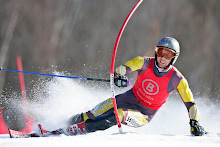In a little more than a week the powers that be in US Skiing will meet in Park City, UT for the annual USSA Congress. The 5-day event is open to all USSA members and features meetings of sport committees and subcommittees, as well as the USSA Board of Directors. Here is a link to the schedule. Over the past couple of months, I have gotten the chance to meet or speak with a number of people involved in the USSA, most notably Dexter Paine (Chairman, Board of Directors), Bill Marolt (CEO), Luke Bodensteiner (Executive VP, Athletics), Darryl Landstrom (Chairman, Alpine Sport Committee) and various trustees, all of whom have have been helpful explaining the complexities of the USSA and what they see as the most pressing issues. I consider it a privilege to engage the top executives in the sport as the Athlete Rep on how to continue moving US Skiing in a positive direction and share the feedback that I have received from USSA members on this topic thus far.
My tentative schedule at the Congress is to serve on the Athlete's Advisory Council, the Board of Directors, and focus on the subcommittees and working groups within the Alpine Sport Committee that are most relevant to my role as Alpine Athlete Rep: the Development and Education Subcommittee, the Collegiate Working Group, and the Quotas and Selections Working Group. I have been in touch with the chair of all three groups to announce my intentions and learn the best way I can serve in these meetings. This may involve presenting in front of the group, or simply advising on issues, each group has their own format.
As you might have guessed, navigating what committee or working group to sit on or speak at is no easy feat. A lot of the alignment of working groups and subcommittees has come under review, not just within the USSA but their regional structure and partnership with local clubs. The latter was addressed in the McKinsey Study released a little over a week ago. The consulting firm proposed a more streamlined approach of governance in accordance with a best practice NGB model, as well as suggestions for improved communications and strengthened club and member value. I support any type of process that achieves these goals, and I am excited to see what the result of the actions the USSA takes to make this happen. However, I was disappointed to see that out of the 100 interviews performed by McKinsey, only 8 were with parents or athletes of the USSA. More alarming was the fact that this "perspective" of USSA stakeholders was not evaluated using traditional interviews, but through their own analysis of a 2012 USSA general survey. McKinsey also groups interviews with Board members and other USSAs who were parents or athletes into this bucket (I was not interviewed), bringing into question how relevant they saw this group in providing input toward building a better organizational structure. Therefore, it is all the more remarkable that the need for a broader communication with the members was still an outcome of this report. Also impressive is the fact that the USSA has already sought to implement these changes to strengthen the communication and transparency between them and the regional and club levels. It's good to hear that people are listening, should make for an interesting week!


0 comments:
Post a Comment